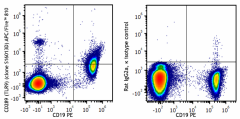- Clone
- S16013D (See other available formats)
- Regulatory Status
- RUO
- Other Names
- CD289, TLR9, Toll-like receptor 9
- Isotype
- Rat IgG2a, κ
- Ave. Rating
- Submit a Review
- Product Citations
- publications

-

Human peripheral blood lymphocyte cells were stained with anti-human CD304 Brilliant Violet 421™ and anti-human CD19 PE, fixed, permeabilized, and then intracellularly stained with anti-human CD289 (TLR9) (clone S16013D) APC/Fire™ 810 (left) or rat IgG2a, κ APC/Fire™ 810 isotype control (right). -

Human peripheral blood mononuclear cells were stained with anti-human CD304 Brilliant Violet 421™ and anti-human CD19 PE, fixed, permeabilized, and then intracellularly stained with anti-human CD289 (clone S16013D) APC/Fire™ 810 (left) or Rat IgG2a, κ APC/Fire™ 810 isotype control (right). -

Human peripheral blood lymphocytes were stained with anti-human CD304 Brilliant Violet 421™, anti-human CD19 PE, and anti-human CD289 (clone S16013D) APC/Fire™ 810 (left) or Rat IgG2a, κ APC/Fire™ 810 isotype control (right).
| Cat # | Size | Price | Quantity Check Availability | Save | ||
|---|---|---|---|---|---|---|
| 394811 | 25 tests | 187 CHF | ||||
| 394812 | 100 tests | 413 CHF | ||||
TLR9 is a member of the toll-like receptor family that aids in recognition of pathogen associated molecular patterns (PAMPs). TLR9 recognizes unmethylated CpG sequences in DNA (ie. intracellular bacteria and DNA viruses). TLR9 signals through the MyD88 pathway leading to inflammatory cytokine production, especially production of type I interferons by pDCs.
Product DetailsProduct Details
- Verified Reactivity
- Human
- Antibody Type
- Monoclonal
- Host Species
- Rat
- Immunogen
- CD289 (TLR9)
- Formulation
- Phosphate-buffered solution, pH 7.2, containing 0.09% sodium azide and BSA (origin USA)
- Preparation
- The antibody was purified by affinity chromatography and conjugated with APC/Fire™ 810 under optimal conditions.
- Concentration
- Lot-specific (to obtain lot-specific concentration and expiration, please enter the lot number in our Certificate of Analysis online tool.)
- Storage & Handling
- The antibody solution should be stored undiluted between 2°C and 8°C, and protected from prolonged exposure to light. Do not freeze.
- Application
-
ICFC - Quality tested
- Recommended Usage
-
Each lot of this antibody is quality control tested by intracellular immunofluorescent staining with flow cytometric analysis. For flow cytometric staining, the suggested use of this reagent is 5 µL per million cells in 100 µL staining volume or 5 µL per 100 µL of whole blood. It is recommended that the reagent be titrated for optimal performance for each application.
* APC/Fire™ 810 has a maximum excitation of 650 nm and a maximum emission of 810 nm.
Excessive exposure to light, and commonly used fixation, permeabilization buffers can affect APC/Fire™ 810 fluorescence signal intensity and spread. Please keep conjugates protected from light exposure. For more information and representative data, visit our Fire Dyes page. - Excitation Laser
-
Red Laser (633 nm)
- Application Notes
-
S16013D clone can be used for both surface and intracellular detection of TLR9. ICFC compatible with both the intracellular flow cytometric staining and True-Nuclear™ transcription buffer set. Does not work for WB (tested on Daudi cell line).
- RRID
-
AB_2927844 (BioLegend Cat. No. 394811)
AB_2927844 (BioLegend Cat. No. 394812)
Antigen Details
- Distribution
-
TLR9 is expressed by B cells and plasmacytoid dendritic cells (pDC).
- Ligand/Receptor
- TLR9 recognizes unmethylated CpG sequences in DNA.
- Cell Type
- B cells, Dendritic cells
- Biology Area
- Bacterial proteins and Toxins, Immuno-Oncology, Immunology, Innate Immunity
- Molecular Family
- CD Molecules, Innate Immune Signaling, Toll Like Receptors
- Antigen References
-
- Hornung V, et al. 2002. J. Immunol. 168:4531.
- Eaton-Bassiri A, et al. 2004. Infect. Immun. 72:7202.
- Krieg, A. 2007. J. Clin. Invest. 117:1184.
- Gene ID
- 54106 View all products for this Gene ID
- UniProt
- View information about CD289 on UniProt.org
Related FAQs
Other Formats
View All CD289 Reagents Request Custom Conjugation| Description | Clone | Applications |
|---|---|---|
| Purified anti-human CD289 (TLR9) | S16013D | ICFC,FC |
| PE anti-human CD289 (TLR9) | S16013D | ICFC,FC |
| Brilliant Violet 421™ anti-human CD289 (TLR9) | S16013D | ICFC,FC |
| APC anti-human CD289 (TLR9) | S16013D | ICFC,FC |
| FITC anti-human CD289 (TLR9) | S16013D | ICFC |
| APC/Fire™ 810 anti-human CD289 (TLR9) | S16013D | ICFC |
Compare Data Across All Formats
This data display is provided for general comparisons between formats.
Your actual data may vary due to variations in samples, target cells, instruments and their settings, staining conditions, and other factors.
If you need assistance with selecting the best format contact our expert technical support team.
-
Purified anti-human CD289 (TLR9)

Human peripheral blood mononuclear cells were stained with C... 
Human peripheral blood mononuclear cells were stained with C... 
Human peripheral blood was stained with CD304 Alexa Fluor® 6... -
PE anti-human CD289 (TLR9)

Human peripheral blood mononuclear cells were stained with C... 
Human peripheral blood mononuclear cells were stained with C... 
Human peripheral blood was stained with CD304 Alexa Fluor® 6... -
Brilliant Violet 421™ anti-human CD289 (TLR9)

Human peripheral blood mononuclear cells were stained with C... 
Human peripheral blood mononuclear cells were stained with C... 
Human peripheral blood was stained with CD304 APC, CD19 FITC... -
APC anti-human CD289 (TLR9)

Human peripheral blood mononuclear cells were stained with C... 
Human peripheral blood mononuclear cells were stained with C... 
Human peripheral blood was stained with CD304 Brilliant Viol... -
FITC anti-human CD289 (TLR9)

Human peripheral blood mononuclear cells were stained with C... -
APC/Fire™ 810 anti-human CD289 (TLR9)

Human peripheral blood lymphocyte cells were stained with an... 
Human peripheral blood mononuclear cells were stained with a... 
Human peripheral blood lymphocytes were stained with anti-hu...
 Login / Register
Login / Register 













Follow Us